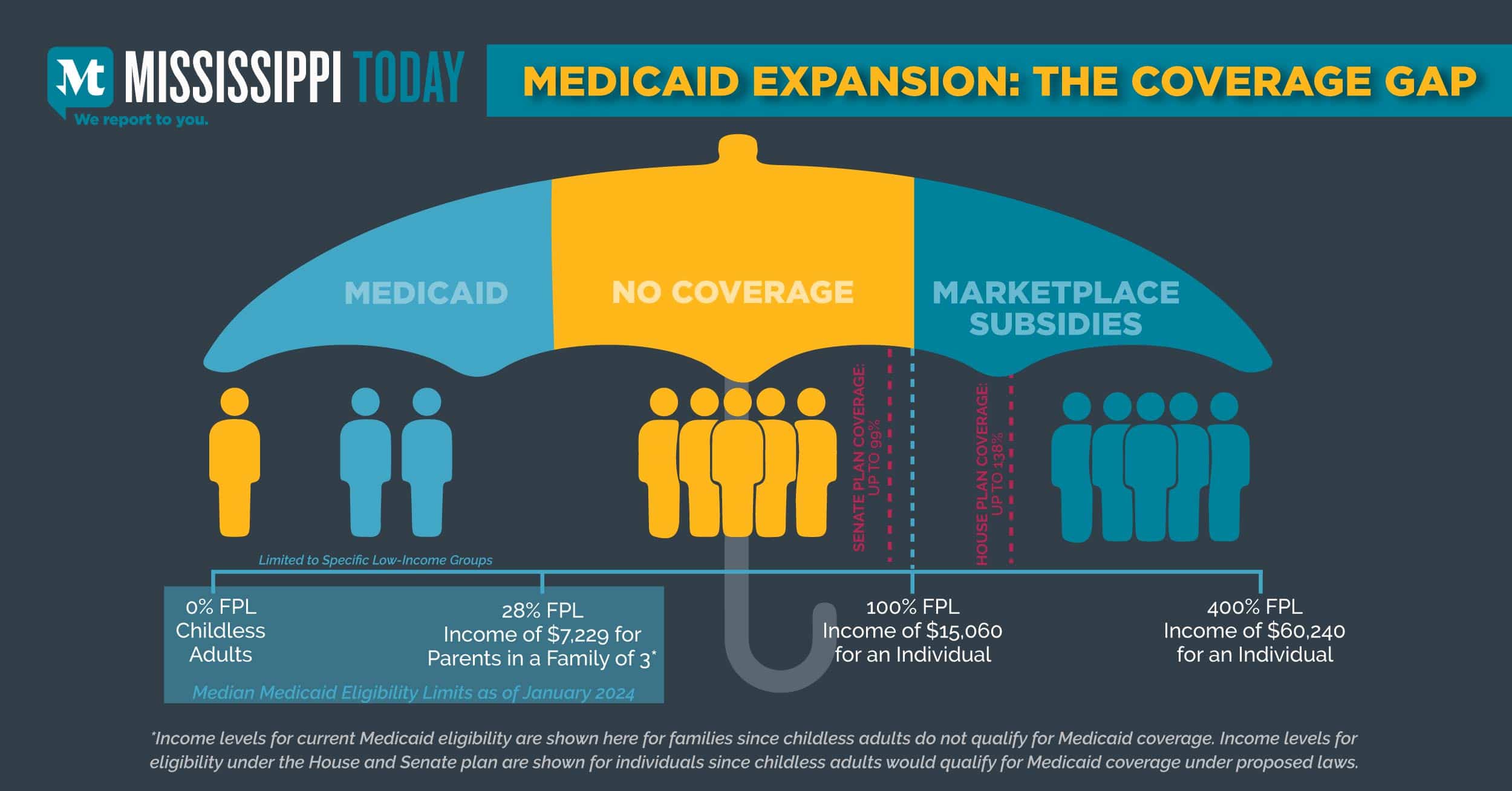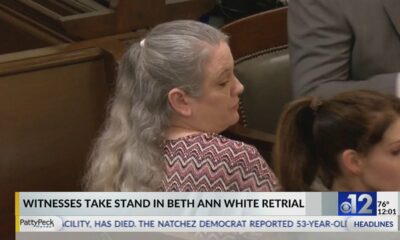Mississippi Today
Mississippi Capitol sees second day of hundreds rallying for ‘full Medicaid expansion now’

Hundreds of people rallied at the Mississippi Capitol for a second day Wednesday, urging lawmakers to expand Medicaid to provide health coverage for an estimated 200,000 Mississippians.
After faith leaders spoke at the Capitol on Tuesday, Care4Mississippi, a coalition of advocates, held a rally Wednesday. Speakers recounted their struggles with access to affordable health care in Mississippi and chanted for the Legislature to, “Close the coverage gap now,” and for “Full Medicaid expansion now.”
Stephanie Jenkins of McComb, a former social worker, lost her job and health insurance after a car wreck left her with debilitating injuries.
She said she later received some medical treatment from the University of Mississippi Medical Center, but still suffers from chronic pain and other ailments. She said she was told she could not receive Medicaid coverage because she owns too much property.
Jenkins said that years after her accident, “I'm still fighting that battle. I'm still trying to get health insurance. I am still trying to get Medicaid … The state of Mississippi does not realize that it is not about money. It is not about race. It is about people. People are dying because they have no health insurance.”
Dr. Randy Easterling, a Vicksburg family physician and former executive director of the Mississippi Medical Association, spoke in favor of Medicaid expansion. He said the people who would be helped by the expansion primarily work at jobs that do not provide health care and they do not earn enough to purchase private insurance. Many are small business owners.
Easterling said often times the insurance policies available through the federal marketplace exchange have out-of-pocket costs that make them unaffordable for working people if they get sick.
Easterling recounted a story of two of his friends diagnosed with similar cancers. One was uninsured and self-employed, and did not get early diagnosis or treatment. He's now in hospice and on death's door. The other friend, with insurance, received an early diagnosis and treatment and is now cancer free.
“This is a matter of life and death. It is certainly more than a political debate,” Easterling told the crowd.
But the issue of expanding Medicaid is currently engulfed in the political process of the Mississippi Legislature. The House has passed a bill to expand Medicaid as is allowed under federal law to cover those earning up to 138% of the federal poverty or about $20,000 annually for an individual. Under the House plan, the federal government would pay 90% of the health care costs and provide the state with almost $700 million more over the first two years as incentive to expand Medicaid as 40 other states have done.
READ MORE: Experts analyze House, Senate Medicaid expansion proposals, offer compromise plan
Under the Senate plan, coverage would be provided to working people earning less than 100% of the federal poverty level and the federal government would pay much less of the costs.
Studies indicate that the Senate plan would cost the state more and cover fewer people. At the rally, people wore yellow T-shirts that read, “close the coverage gap” and “leave no one behind.”
Easterling said that by refusing to expand Medicaid for the last 11 years, “This state has struck a match to $12 billion … and that money was earmarked specifically to increase access to health care.”
He added, “Two days ago most of us wrote a check to the IRS. Now explain to me in simple terms, I am pretty simple, why my (federal) tax money in Mississippi went to increase access to health care in 40 states and not any of it came back to Mississippi.”

“We take federal money right and left,” Easterling said. “We take hundreds of millions of federal dollars for highways, education, the Health Department, law enforcement and natural disasters … But for some reason we push back on additional money for health care. I would submit to you this is a matter of life and death.”
Robin Y. Jackson, with the Mississippi Black Women's Roudtable, told of dropping out of school to care for a family member. In the process she developed a chronic health problem. She said she was unable to get help, but later got a job with health insurance even though her employer knew she had costly medical maladies. After surgeries costing tens of thousands of dollars, she said she is finally well.
“I was lucky,” she said. Others are not so lucky. She said with Medicaid expansion everyone could receive the treatment she was lucky enough to receive.
She said as shepherds of Mississippians, politicians should strive “to leave no one behind.”
Sonya Williams Branes, a former legislator, a small business owner and state policy director for the Southern Poverty Law Center, recounted the struggles she faced with her young son who had chronic asthma. As a small business owner at the time, she struggled to provide health care for her family and her employees.
“To ensure my son remained eligible for CHIP, a program that provided him with vital medical care, I was forced into a corner,” Barnes said. “Making more money, expanding my business and hiring more staff – all paths to improving our lives – would disqualify him from the program, pushing essential health care out of reach.
“Our system is broken,” Barnes said. “It punishes ambition and stifles growth.”
Before the Care4Mississippi rally, the Legislative Black Caucus on Wednesday morning held a press conference calling for adoption of the House's more expansive Medicaid coverage plan.
“We remain committed to having full expansion and covering as many working Mississippians as possible,” said House Minority Leader Robert Johnson, D-Natchez. “Our goal is to sustain health care in Mississippi and sustain it in a way that it doesn't matter where you live or what your income is.”
This article first appeared on Mississippi Today and is republished here under a Creative Commons license.
Mississippi Today
On this day in 1945
April 30, 1945

Sister Rosetta Tharpe, known as the “godmother of rock ‘n' roll,” made history by becoming the first gospel artist to rocket up the R&B charts with her gospel hit, “Strange Things Happening Every Day.” In so doing, she paved the way for a strange new sound.
“Rock ‘n' roll was bred between the church and the nightclubs in the soul of a queer Black woman in the 1940s named Sister Rosetta Tharpe,” National Public Radio wrote. “She was there before Elvis, Little Richard and Johnny Cash swiveled their hips and strummed their guitars. It was Tharpe, the godmother of rock ‘n' roll, who turned this burgeoning musical style into an international sensation.”
Born in Arkansas, the musical prodigy grew up in Mississippi in the Church of God in Christ, a Pentecostal denomination that welcomed all-out music and praise. By age 6, she was performing alongside her mandolin-playing mother in a traveling evangelistic troupe. By the mid-1920s, she and her mother had joined the Great Migration to Chicago, where they continued performing.
“As Tharpe grew up, she began fusing Delta blues, New Orleans jazz and gospel music into what would become her signature style,” NPR wrote.
Her hard work paid off when she joined the Cotton Club Revue in New York City. She was only 23. Before the end of 1938, she recorded gospel songs for Decca, including “Rock Me,” which became a huge hit and made her an overnight sensation. Little Richard, Aretha Franklin and Jerry Lee Lewis have all cited her as an influence.
“Sister Rosetta played guitar like the men I was listening to, only smoother, with bigger notes,” said singer-songwriter Janis Ian. “And of course, personally, any female player was a big influence on me, because there were so few.”
After hearing her successors on the radio, Tharpe was quoted as saying, “Oh, these kids and rock and roll — this is just sped up rhythm and blues. I've been doing that forever.”
On the eve of a 1973 recording session, she died of a stroke and was buried in an unmarked grave. In the decades that followed, she finally began to receive the accolades that had eluded her in life.
In 2007, she was inducted into the Blues Hall of Fame, and money was raised for her headstone. Eleven years later, she was inducted into the Rock and Rock Hall of Fame.
“She was, and is,” NPR concluded, “an unmatched artist.”
This article first appeared on Mississippi Today and is republished here under a Creative Commons license.
Mississippi Today
House agrees to work requirement, Senate concedes covering more people in Medicaid expansion deal
With minutes to spare before a Monday-night deadline, House negotiators conceded a Senate demand that Medicaid expansion would include a strict work requirement for those covered — a requirement not likely to be approved by the federal government.
The Senate had already backed off its initial proposal that would only cover the poorest of the poor, would still leave tens of thousands of poor working Mississippians uninsured and would have turned down billions in federal money to cover the costs.
House and Senate negotiators agreed to a deal that would expand Medicaid to about 200,000 people who make up to 138% of the federal poverty level, roughly $20,000 for an individual. It would require recipients to prove they work for at least 25 hours a week.
The plan will be a “hybrid,” as first proposed by the House. People up to 99% of the federal poverty level would be covered by traditional Medicaid. Those making 100% to 138% of FPL would be covered with subsidized private insurance plans from the federal exchange.
Neither House Medicaid Chair Missy McGee, a Republican from Hattiesburg, nor Senate Medicaid Chair Kevin Blackwell, a Republican from Southaven, answered questions from reporters at the Capitol about the agreement on Monday night.
“A compromise requires concessions between the chambers,” Republican Lt. Gov. Delbert Hosemann said in an earlier statement. “The Senate requires a real work requirement, but our plan now covers individuals up to 138 percent of the federal poverty level.”
The Affordable Care Act, the federal legislation that allows states to expand Medicaid coverage, does not authorize work requirements. However, states can seek a federal waiver from the Centers for Medicare and Medicaid Services to implement them.
CMS under the Trump administration did sign off on some states using work requirements, but under the Biden administration, the federal agency has not approved requests and rescinded the ones that had been approved.
The House's original plan directed state officials to seek a waiver for work requirements, but would have expanded Medicaid even if the federal agency denied it. House leaders previously pointed out that people with income above the federal poverty level are likely working.
The Senate, however, drew a hard line that it would only agree to an expansion plan that contained work requirements — a stance that could at the least delay expanded coverage, perhaps for years, or prevent it from ever happening.
READ MORE: House, Senate leaders swap Medicaid expansion proposals as Monday night deadline nears
If CMS denies Mississippi's waiver for a work requirement, the compromise proposal directs the state Division of Medicaid to apply for a work requirement waiver each year the first denial.
It also directs state officials to immediately apply for a waiver if CMS starts approving work requirements in other states.
Senate leaders have expressed optimism that the Biden administration will be so pleased with longtime Medicaid expansion holdout Mississippi making an effort that it would approve a work requirement, or that the conservative federal 5th Circuit Court would approve it if litigated.
Work requirements in states that previously had them proved to be costly and ineffective, with a large amount of costs going into administration of the work requirements instead of medical services.
The agreed proposal will likely bring an end to several days of House and Senate negotiators trading proposals back and forth with one another behind closed doors.
Right up to the 8 p.m. Monday deadline, it was unclear if legislative leaders would reach a compromise. They signed the agreement with only minutes to spare.
Reporters, lobbyists and advocates gathered at the Capitol waiting to see if lawmakers could broker a deal to establish what many believe could be the most transformative state policy since Gov. William Winter's Education Reform Act of 1982.
But despite earlier vows by House and Senate leaders to negotiate Medicaid expansion in public, the final details were worked out behind closed doors and negotiators declined comment Monday night.
Now that the negotiators have signed off on an agreement, the Capitol's two chambers have until Wednesday to either approve the proposal, reject it or send it back to negotiators for further work. The 2024 legislative session is expected to end within days, although lawmakers have already had to push back deadlines for agreeing to a state budget.
The Medicaid expansion proposal places a 3% tax on managed care organizations to cover the state's costs, and the Legislature's rules require a three-fifths majority of the lawmakers in both chambers to approve bills that enact taxes.
But the actual threshold the two chambers likely need to achieve is a two-thirds majority, needed to override a potential veto from Republican Gov. Tate Reeves, a longtime opponent of expansion.
Passage of the compromise, particularly by a wide margin, may be difficult in both chambers. House Democrats, who support Medicaid expansion, have threatened to oppose any bill with a work requirement. Any expansion measure is a tough sell in the Senate, and its earlier more austere plan barely garnered a two-thirds vote.
Senate Minority Leader Derrick Simmons, D-Greenville, on Monday night said he was glad the two chambers came to an agreement and he looks forward to seeing more details.
“I am grateful we are finally at a point where we are working to provide access to health care to Mississippians who desperately need it and have been waiting for it for a long time,” Simmons said.
This article first appeared on Mississippi Today and is republished here under a Creative Commons license.
Mississippi Today
Law enforcement officers’ oversight bill heads to governor’s desk
The Mississippi Senate passed legislation Monday to give the state's officer certification board the power to investigate law enforcement misconduct.
House Bill 691, the revised version of which passed the House Saturday, is now headed to the desk of Gov. Tate Reeves.
The bill comes in the wake of an investigation by the Mississippi Center for Investigative Reporting at Mississippi Today and The New York Times into sheriffs and deputies across the state over allegations of sexual abuse, torture and corruption. The reporting also revealed how a “Goon Squad” of officers operated for two decades in Rankin County.
Public Safety Commissioner Sean Tindell said if the governor signs the bill, he anticipates the Mississippi Board on Law Enforcement Officer Standards and Training would hire a few investigators to investigate matters and make recommendations.
The bill would enable the board to establish a hearing panel on any law enforcement officer “for whom the board believes there is a basis for reprimand, suspension, cancellation of, or recalling the certification of a law enforcement officer. The hearing panel shall provide its written findings and recommendations to the board.”
In addition, deputies, sheriffs and state law enforcement would join police officers in the requirement to have 20 hours of training each year. Those who fail to get such training could lose their certifications.
Other changes would take place as well. Each year, the licensing board would have to report on its activities to the Legislature and the governor.
The bill calls for a 13-member board with the governor having six appointments – two police chiefs, two sheriffs, a district attorney and the head of the law enforcement training academy.
Other members include the attorney general, the public safety commissioner, the head of the Highway Patrol, and the presidents of the police chiefs association, the constable association, the Mississippi Campus Law Enforcement Association and the sheriff's association (or designee).
This article first appeared on Mississippi Today and is republished here under a Creative Commons license.
-
Local News5 days ago
Sister of Mississippi man who died after police pulled him from car rejects lawsuit settlement
-
Mississippi Today5 days ago
At Lake High School in Scott County, the Un-Team will never be forgotten
-
Mississippi Today2 days ago
On this day in 1951
-
Mississippi News3 days ago
One injured in Mississippi officer-involved shooting after chase
-
Mississippi News7 days ago
Viewers make allegations against Hatley teacher, school district releases statement – Home – WCBI TV
-
Mississippi News Video6 days ago
Vehicle struck and killed man lying in the road, Alcorn County sheriff says
-
Mississippi News5 days ago
Ridgeland man sentenced for molesting girl
-
Mississippi News6 days ago
Suspected Dollar General armed robber arrested in Pickens County








































